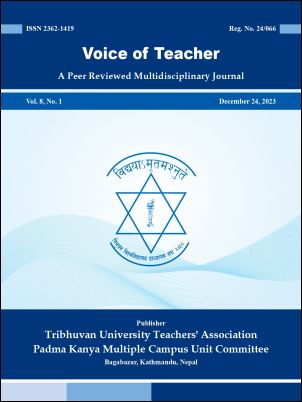Construction, Deconstruction, and the Question of Authorship in Magical Realist Narratives
DOI:
https://doi.org/10.3126/vot.v8i1.60829Keywords:
colonialism, postmodernism, magical realism, decolonizing agency, subjectivity, multiplicityAbstract
Colonial discourse in particular has constructed fixed frames and grids in which to place and separate individuals according to their class, race, gender, culture, nationality and ethnic models of unified and stereotypical representation of otherness and difference which postcolonial writers challenge. Writers from across the globe have adopted and adapted magical realism to fit their own cultures and within their own frame of reference. As a dominant literary mode, it can be considered as a decolonizing agent in a postmodern context. What the narrative mode offers is a way to discuss alternative approaches to reality to that of Western philosophy, expressed in contemporary fiction. Specifically, this paper argues how magical realism is positioned in relation to the two contrasting operations of construction and deconstruction. What is its capacity to affect either or both of these outcomes? A prominent view has developed which understands the mode as one that structures an exclusively deconstructive narratology. I explore the narratives of Isabel Allende’s The House of the Spirit, Tony Morrison’s Beloved and Hashem Garaibeh’s The Cat Who Taught Me How To Fly that reiterate realist narrative conventions subversively to critique the effects of colonialism as a decolonizing device in the contemporary literary scholarship. This study utilizes the ideas from Stephen Slemon’s “resistance to colonialism,” Theo D’haen’s “decenter privileged centers,”, Wendy B. Faris’s “Questioning the colonial subjugation,” and Christopher Warnes’s ‘deconstructive notions of subjectivity” and “recover and affirm identities.” Thus, the narratives in opposition to the notion of absolute history emphasize the possibility of simultaneous existence of multiple truths and plural meanings.




